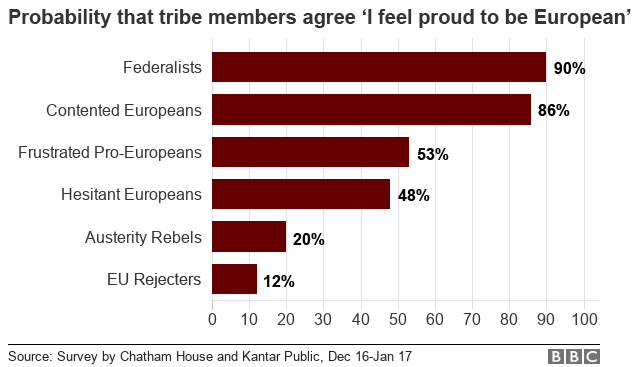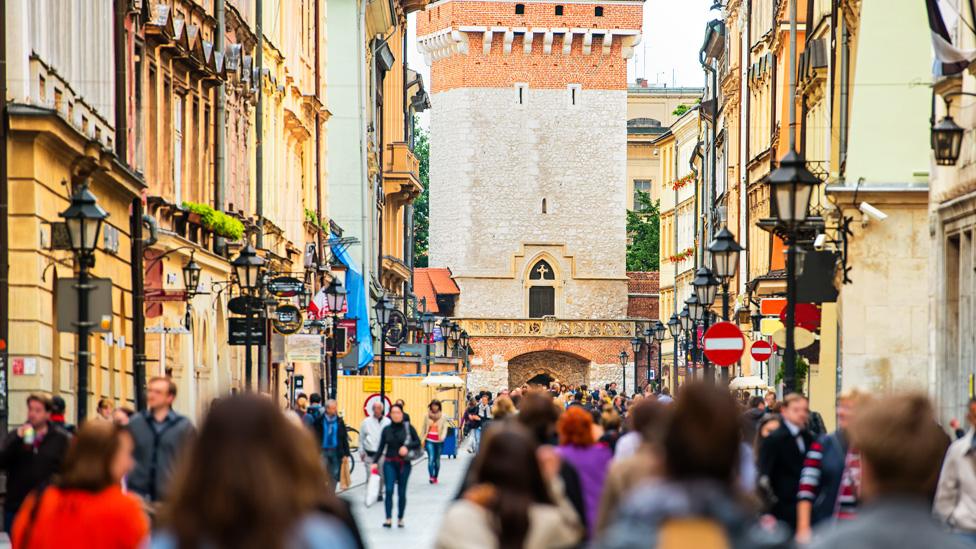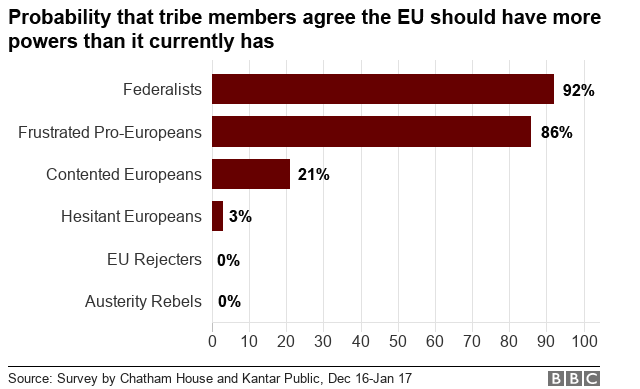The six tribes that could shape Europe's future
- Published

In the UK it can appear that there is only one political issue being discussed - Brexit. But research suggesting the existence of six European "tribes" points towards the benefits a more varied debate could bring across the EU.
The refugee crisis, the rise of populist parties across Europe and the UK's vote for Brexit have all sparked intense debate about the future of the EU in recent years.
Often, people are considered to be on one side of an argument or the other: Leave or Remain, for example.
But our analysis of a poll of more than 10,000 people, external across 10 European countries, carried out in December 2016 and January 2017 for Chatham House, suggests far greater diversity - and the existence of six distinct political "tribes".
From Warsaw to Madrid and Brussels to Budapest, the tribes offer clues as to how they may shape and influence the continent's politics in the years to come.
The groups were identified by their answers to questions including:
whether the EU should have more or less power
whether immigration has been positive or negative
whether richer states should support poorer states
Tribe members come from different walks of life and we will continue to learn more about them from the results of an interactive quiz allowing users to explore the data and see which tribe matches their views, external.

Here are the tribes we identified, in order of approximate size:
Hesitant Europeans - 36%
Hesitant Europeans sit in the middle on many issues but tend to be in the centre or to the right politically.
They are ambivalent about the EU and are more likely than others to be apathetic about politics.
Many are also concerned about immigration and tend to prioritise national sovereignty over deeper EU integration.
They are comprised of people with a mix of incomes and come from a wide range of European countries.
Contented Europeans - 23%
Contented Europeans are optimistic and positive about the EU.
They are often young, broadly socially liberal and generally positive about immigration.
They believe they benefit from the EU and feel well informed about how it works.
They tend to favour the status quo above further integration.
They are particularly likely to live in Central European countries such as Hungary and Poland and to lean to the left politically.

Krakow: "Contented Europeans" are particularly likely to live in Central Europe
EU Rejecters - 14%
EU Rejecters overwhelmingly feel the EU is undemocratic and has too much power.
They are the least likely tribe to feel any benefits of EU membership or solidarity with other Europeans.
Many feel angry about politics and the EU, with most feeling negative about immigration.
The countries they are most likely to come from include Britain and Austria, and they are the most likely to live in rural areas.
Frustrated Pro-Europeans - 9%
Frustrated Pro-Europeans want a more powerful EU driven by "progressive values".
At present, however, they don't feel the benefits of EU membership.
They support richer states helping poorer ones, but their views about immigration are more mixed than those of other pro-Europeans.
This tribe is split relatively evenly across age groups, and they are more likely to come from France, Italy and Belgium.
Austerity Rebels - 9%
Austerity Rebels are dissatisfied with politics and want a looser, "more democratic" EU - with powers returned to member states.
They tend to think richer states should support poorer ones and that each state should accept its share of refugees.
Austerity Rebels are more likely than members of the other groups to be unemployed and to have experienced social hardship.
They are generally middle-aged or older and especially likely to live in countries in southern Europe that were hit by the euro crisis, especially Greece and Italy.

Anti-austerity protesters in Athens, November 2017
Federalists - 8%
Federalists support a deeply integrated "United States of Europe".
This tribe is wealthier, older and disproportionately male.
They feel the EU has benefited them and they are very positive about immigration.
On average, they are the highest educated group, with strong and diverse social networks.
They are especially common in southern Europe, particularly Spain and Italy, and are the most likely of any group to live in a city.
The tribes punching above their weight
In reality, many people will have things in common with more than one group - but everyone will be closer to one tribe than any other.
The most important differences between these groups can be illustrated by looking at their answers to key questions.
For example, the tribes offer very different answers to the question of whether the EU should have more powers than it currently has.
The EU Federalists and Frustrated Pro-Europeans want to hand the EU greater powers, Contented Europeans support the status quo, Hesitant Europeans lean towards powers being returned to their nation state, while Austerity Rebels and EU Rejecters firmly want that.
Differences such as these suggest three important implications for Europe's future.

First, it highlights the limitations of some debates about the EU - which can sometimes offer a black and white choice such as "pro" or "anti" - if the diverse tribes do not feel their own values and attitudes are reflected.
Secondly, the six tribes do not directly correspond to party politics in many countries, or the European Parliament.
It is also the case that some tribes have greater political influence than others.
Despite accounting for fewer than one in four people between them, the EU Federalists - who appear to punch well above their weight in elite circles - and the EU Rejecters, can appear to dominate debate at either end of the political spectrum.
In contrast, the Hesitant Europeans and Frustrated Pro-Europeans tend to scatter across party lines.
Their ambivalence about political issues, including the EU, can mean that their views receive less attention from the media and politicians than those with a very clear position.
Thirdly, it appears to be the case that the Hesitant Europeans are the "swing group".

Although this tribe currently accounts for about one in three people, there is no reason why it shouldn't grow, or shrink, over time.
Its members' views may shift and it is possible that some could join other tribes, such as the EU Rejecters or Contented Europeans.
Many Hesitant Europeans are apathetic, but they are also likely to be sceptical of closer European integration and worried about immigration.
Speaking to these concerns and appealing to the tribe will be central to the success, or failure, of future political leaders.
The Hesitant Europeans, therefore, appear to be the key to the EU's political future.

About this piece
This analysis piece was commissioned by the BBC from an outside organisation called Chatham House, which describes itself as an independent policy institute, external.
Matthew Goodwin, external, Thomas Raines, external and David Cutts, external are members of its Europe Programme.
Their analysis is based on a Chatham House and Kantar Public online poll of 10,000 people, external, conducted in December 2016 and January 2017, in Austria, Belgium, France, Germany, Greece, Hungary, Italy, Poland, Spain and the United Kingdom.
The poll used a representative sample of populations and Chatham House estimates that these countries include more than 75% of the EU population, with the survey covering a mix of nations from across Europe.
The tribes were developed using a technique called "latent class analysis", using eight questions, external.

Edited by Duncan Walker
